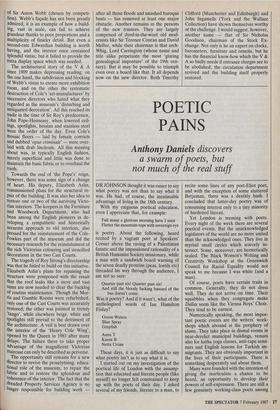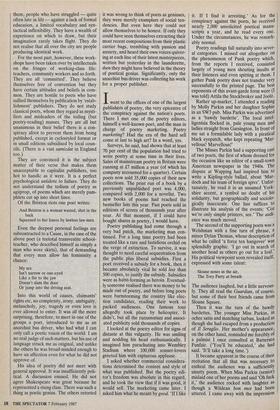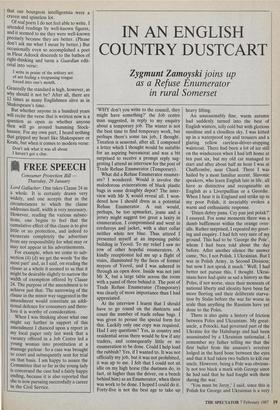POETIC PAINS
Anthony Daniels discovers
a swarm of poets, but not much of the real stuff
DR JOHNSON thought it was easier to say what poetry was not than to say what it was. He had, of course, the inestimable advantage of living in the 18th century.
With my exiguous poetical education, even I appreciate that, for example:
Full many a glorious morning have I seen Flatter the mountain-tops with sovereign eye
is poetry. About the following, heard recited by a vagrant poet at Speakers' Corner above the raving of a Palestinian fanatic and the impassioned rationality of a British Humanist Society missionary, while a man with a sandwich board warning of the seven deadly proteins (peas, lentils etc) threaded his way through the audience, I am not so sure:
Quarter past six! Quarter past six!
And still the bloody fucking bastard of the bus doesn't come.
Was it poetry? And if it wasn't, what of the anthologised words of Ian Hamilton Finlay?
Green Waters Blue Spray Grayfish Anna T Karen B Netta Croan
These days, it is just as difficult to say what poetry isn't as to say what it is.
I started out on my investigation of the poetical life of London with the assump- tion that educated and literate people (like myself) no longer felt constrained to keep up with the poets of their day. I asked several of my friends, literate to a man, to recite some lines of any post-Eliot poet, and with the exception of some stuttered Betjeman, there was a deathly hush. I concluded that latter-day poetry was of consuming interest only to a tiny minority of hardened literati.
Yet London is teeming with poets. Every night of the week there are several poetical events. But the unacknowledged legislators of the world are no more united than the acknowledged ones. They live in myriad small circles which scarcely in- tersect. Some, moreover, are hermetically sealed. The Black Women's Writing and Creativity Workshop at the Greenwich Council for Racial Equality would not speak to me because I was white (and a man).
Of course, poets have certain traits in common. Generally, they do not dress well. They do not arrive on time. Their squabbles when they congregate make Dallas seem like the Vienna Boys' Choir. They tend to be earnest. Numerically speaking, the most impor- tant poetic events are the writers' work- shops which abound at the periphery of slums. They take place in dismal rooms in near-derelict municipal buildings, venues also for hatha yoga classes, anti-rape semi- nars and English lessons for Turkish im- migrants. They are obviously important in the lives of their participants. There is something desperately sad about them.
Many were founded with the intention of giving the inarticulate a chance to be heard, an opportunity to develop their powers of self-expression. There are still a few genuinely working-class poets among them, people who have struggled — quite often late in life — against a lack of formal education, a limited vocabulary and syn- tactical inflexibility. They have a wealth of experience on which to draw, but their imagination rarely takes flight. They do not realise that all over the city are people producing identical work.
For the most part, however, these work- shops have been taken over by intellectuals on the fringes of working-class life: teachers, community workers and so forth. They are all 'committed'. They believe themselves free of convention but they have certain attitudes and beliefs in com- mon. They are hostile to poets who have sullied themselves by publication by 'estab- lishment' publishers. They do not study classical poets, whom they regard as mysti- fiers and misleaders of the toiling (but poetry-reading) masses. They are all but unanimous in their belief there is a con- spiracy afoot to prevent them from being published, except in cyclostyled format or in small editions subsidised by local coun- cils. (There is a vast samizdat in England too.) They are convinced it is the subject matter of their verse that makes them unacceptable to capitalist publishers, too hot to handle as it were. It is a perfect psychological antidote to failure. They do not understand the tedium of poetry as agitprop, of poems which are merely pam- phlets cut up into short lines.
Of the Brixton riots one poet writes:
And Brixton is a woman wasted, shot in the back Squeezed to her knees by lawless law-men.
Even the deepest personal feelings are subcontracted to a Cause, in the case of the above poet (a teetotal transvestite school- teacher, who described himself as simply a man who wore skirts), that of demanding that every man allow his femininity a chance:
My sex Isn't narrow or one-eyed Like a fist to the jaw Doesn't slam the door Or jump into the driving seat.
Into this world of causes, claimants' rights etc, no complexity, irony, ambiguity, melancholy, joy, tragedy or even love is ever allowed to enter. It was all the more surprising, therefore, to meet in one of the groups a poet, introduced to me as an anarchist bus driver, who had what I can only call a poetic vision of the world. I am no real judge of such matters, but his use of language struck me as original, and unlike the others he was broad-minded enough to have an affection even for what he did not approve of.
His idea of poetry did not meet with general approval. It was insufficiently poli- tical. A discussion ensued. He did not agree Shakespeare was great because he represented a rising class. There was such a thing as poetic genius. The others retorted it was wrong to think of poets as geniuses, they were merely examplars of social ten- dencies. But even here they could not allow themselves to be honest. If only they could have seen themselves extracting their most recent compositions from their plastic carrier bags, trembling with passion and anxiety, and heard their own voices quiver- ing at each line of their latest masterpieces, written but yesterday in the launderette, then they might have believed in the theory of poetical genius. Significantly, only the anarchist bus driver was collecting his work for a proper publisher.
Iwent to the offices of one of the largest publishers of poetry, the very epicentre of the conspiracy against the nation's poets. There I met one of the poetry editors, himself a well-known poet, and the man in charge of poetry marketing. Poetry marketing? Had the era of the hard sell come at last to high art? In a word, yes.
Surveys, he said, had shown that at least 70 per cent of the population had tried to write poetry at some time in their lives. Sales of mainstream poetry in Britain were running at £7 million a year (of which his company accounted for a quarter). Certain poets now sold 35,000 copies of their new collections. The print run of a book by a previously unpublished poet was 4,000, compared with 2,000 for a novelist. Two new books of poems had reached the bestseller lists this year. Past poets sold in editions of scores of thousands year after year. At that moment, if I could have bought shares in poetry, I would have.
Poetry publishing had come through a very bad patch, the marketing man con- tinued. For a long time poetry had been treated like a rare and fastidious orchid on the verge of extinction. To survive, it was thought to need careful sequestration from the public plus liberal subsidies. First a poet received a subsidy for a book, then it became absolutely vital he sold less than 500 copies, to justify the subsidy. Subsidies were as habit-forming as heroin. Eventual- ly someone realised there was money to be made out of poetry, and before long poets were barnstorming the country like elec- tion candidates, reading their work to packed audiences. One famous tour allegedly took place by helicopter. It didn't, but all the razzamatazz and associ- ated publicity sold thousands of copies.
I looked at the poetry editor for signs of distaste at this vulgarity. He was smiling and nodding his head enthusiastically. I imagined him parachuting into Wembley Stadium where 100,000 sonnet-lovers greeted him with rapturous applause.
I asked whether commercial considera- tions determined the content and style of what was published. But the poetry edi- tor's freedom was absolute in this regard, and he took the view that if it was good, it would sell. The marketing came later. I asked him what he meant by good. 'If I like it. If I find it arresting.' As for the conspiracy against the poets, he received nearly 2,000 unsolicited poetical manu- scripts a year, and he read every one. Under the circumstances, he was remark- ably normal.
Poetry readings fall naturally into sever- al categories. I missed out altogether on the phenomenon of Punk poetry which, from the reports I received, consisted largely of young men shouting insults at their listeners and even spitting at them. I gather Punk poetry does not transfer very successfully to the printed page. The best exponents of this avant-garde form were (I was told) Attila the Stockbroker and Joo12.
Rather up-market, I attended a reading by Molly Parkin and her daughter Sophie in an SW3 pub. Miss Parkin was advertised as a 'bawdy bardette'. The local intel- ligentsia flocked in, pale young men and ladies straight from Garsington. In front of me sat a formidable lady with a piratical black eyepatch, who kept repeating 'Mar- vellous! Marvellous!'
The Misses Parkin had a supporting cast of two poets, the first of whom dressed for the occasion like an editor of a small-town American newspaper in the 1940s. The dispute at Wapping had inspired him to write a Kipling-style ballad, about 'Mur- doch and his team of foreign spivs'. Unfor- tunately, he read it in an assumed York- shire accent, a symbol no doubt of his solidarity, but geographically and sociolo- gically inaccurate. One line suffices to illustrate his analysis of the events: 'Coz we're only simple printers, see.' The audi- ence was much moved.
The second of the supporting poets was a Welshman with a fine turn of phrase, a minor Dylan Thomas, whose description of what he called 'a force ten hangover' was splendidly graphic. 'I go out in search of another head as others go out for a loaf.' His political viewpoint soon revealed itself, expressed with some talent:
Sloane noses in the air, The Tory Party at breath
The audience laughed, but a little nervous- ly. They all read the Guardian, of course, but some of their best friends came from Sloane Square.
Then it was the turn of the bawdy bardettes. The younger Miss Parkin, in ochre satin and matching turban, looked as though she had escaped from a production of II Seraglio. Her mother's appearance, on the other hand, reminded me forcibly of a palmist I once consulted at Battersea Funfair. (`You'll be educated,' she had said. 'It'll take a long time.') It became apparent in the course of their recitation that all that was necessary to enthral the audience was a sufficiently smutty poem. When Miss Parkin (senior) mislaid one of her poems and said 'Oh fuck it,' the audience rocked with laughter as though a Wildean bon mot had been uttered. I came away with the impression that our bourgeois intelligentsia •were a craven and spineless lot. Of real poets I do not feel able to write. I attended readings by well-known figures, and it seemed to me they were well-known precisely because they are better. (Please don't ask me what I mean by better.) But occasionally even so accomplished a poet as Fleur Adcock descends to the bathos of right-thinking and turns a Guardian edit- orial into verse:
I write in praise of the solitary act: of not feeling a trespassing tongue forced into one's mouth.. .
Generally the standard is high, however, as why should it not be? After all, there are 12 times as many Englishmen alive as in Shakespeare's time.
But whether anyone in a hundred years will recite the verse that is written now is a question as open as whether anyone then will go around humming Stock- hausen. For my own part, I heard nothing that gripped my heart like Shakespeare or Keats, but when it comes to modern verse:
Don't ask what it was all about I haven't got a clue.




















































 Previous page
Previous page